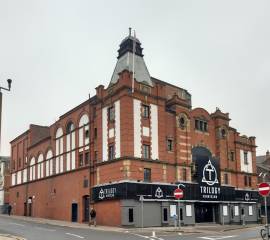Let's sell ale under 'Brand Britain' logo
Am I the only one who thinks there's something attractive about the idea of a think-tank?
After all, in a way that's what every pub in the land is - or should be. A place to express opinions, exchange ideas and put the world to rights. The big fish from Demos or the Adam Smith Institute get paid for the thinking they do, whereas the remuneration dished out to those outlining radical new tax proposals in the lounge of the Royal Oak or the Red Lion is of a spiritual nature. But the two are still linked. When it's time for an idea to be put into practice, nothing will hold it back. Just ask the remnants of the French monarchy.
I must admit, though, to a certain surprise when John Roberts, recently appointed managing director of Fuller's Beer Company, told me that Why Handpull? - the latest entrant in the race to save cask ale from being washed away in a tide of lager - was a think-tank. "We meet a couple of times a year," Roberts said. "We look at special issues. We try to represent the views of all the industry."
Can six of the biggest players in the cask-ale market really do that? "We try not to be self-interested," Roberts replied. "We try to tackle everything which is of relevance to the cask-ale industry. Don't forget that cask ale is still sliding by 7% a year in volume. We used to be able to blame it on the big brewers losing their share of the cask-ale market, but that's pretty well all gone now. We can't do that any more."
I thought Camra and the Society of Independent Brewers (SIBA) already did quite a good job for cask ale but Roberts replied that he thought both represented "fringe interests". Indeed one of the first thoughts to come out of the Why Handpull? tank could be construed as something of a jab in the eye for Camra because Why Handpull? believes a lot of pubs have too many handpulls.
Fewer handpulls, better beer
"Unless a pub is selling at least two firkins of a particular ale a week, then that line is not viable," says Roberts. "Otherwise you just end up with lots of fancy handpumps with vinegar underneath them." Anyone who travels the country taking a chance on ales rather than drinking them only at a tried-and-trusted local will know that this is indeed a big problem, and if Why Handpull? can succeed in getting more consistency into cask ale quality then it will already have justified its existence.
When I asked about other activities, though, it was almost easier to define what the new organisation wouldn't do than what it would. There is no intention to mean anything much to the general public, for example, and don't expect any beer festivals either. Generic
advertising and promotion wasn't ruled out, but the cost of it evidently didn't appeal much to the members. Political lobbying on issues such as differential duty rates was "not something we want to be involved with".
Publications of some sort, however, were "likely". Roberts also indicated that Why Handpull? is keen to work on practical issues such as dispense temperature, and likely to challenge the role of Cask Marque "in order to help it and make it stronger".
Anything that helps the cause of real ale is welcome, of course, but I can't help wondering whether yet another modestly funded, modestly ambitious, modestly well-meaning organisation joining those that already exist is really needed right now.
What British cask-conditioned ale needs is a really strong body behind it to both communicate what it is and underline why it is so precious, and to raise its quality in general with basic, well-policed rules and regulations concerning production and service.
The model for this is the wine industry, and any such organisation would be able to draw on the strengths of both the New World (strong on marketing, the consumer focus and the sense of a national brand such as Brand Australia) and Old World (where legislative systems such as France's AOC or Spain's DO have been excellent at dragging up the weakest performers, ensuring minimum consistency levels and protecting the best achievements of tradition).
Sell real ale as 'Brand Britain'
Great real ale would be perfect for selling under a Brand Britain banner, since it is unique in world terms, its quality is (at best) as good or better than any beer produced and its production summarises the unity in diversity which in so many ways is what Britain is all about. Such an organisation would incorporate both Cask Marque and Why Handpull?, and I can see no reason why the members of SIBA and the Independent Family Brewers of Britain shouldn't join hands under its banner. Camra would be an honoured and respected affiliate organisation.
This organisation would communicate and promote, both in this country and overseas. It would have every right to call on government support, for much the same reasons (employment and cultural patrimony) that European wine industries enjoy support from their own governments.
Yes, even in the desperate straits in which real ale finds itself at present there is a way to do this. What's missing is the will.














